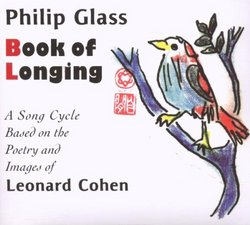| All Artists: Philip Glass, Leonard Cohen Title: Glass: Book of Longing Members Wishing: 3 Total Copies: 0 Label: Orange Mountain Music Original Release Date: 1/1/2007 Re-Release Date: 12/11/2007 Genres: Dance & Electronic, Folk, Pop, Classical Styles: Techno, Singer-Songwriters, Vocal Pop, Chamber Music, Historical Periods, Classical (c.1770-1830) Number of Discs: 2 SwapaCD Credits: 2 UPC: 801837004328 |
Search - Philip Glass, Leonard Cohen :: Glass: Book of Longing
 | Philip Glass, Leonard Cohen Glass: Book of Longing Genres: Dance & Electronic, Folk, Pop, Classical
|
Larger Image |
CD Details |
CD ReviewsA winning combination Marvin Cohodas | Vancouver, BC, Canada | 01/26/2008 (5 out of 5 stars) "Philip Glass has based his career on the moral and artistic benefits of collaboration. His collaboration with poets has been especially fruitful. An earlier example is the Hydrogen Jukebox song cycle set to poems by Allen Ginsberg, which also included Wichita Vortex Sutra recited by Ginsberg and accompanied by Glass on the piano. Book of Longing represents another achievement in this genre, involving 22 poems by Leonard Cohen, some read by Cohen and others sung by members of the Philip Glass ensemble. Of the read poems, one, the prologue ("I can't make the hills") includes a somber accompaniment throughout, while most of the others are unaccompanied counterpoints to instrumental solos. Some of the sung poems have been recorded as songs by Cohen but Glass provides completely new melodies for them. So much for the background. Structure is always clear and instructive in Glass's narrative compositions. The cycle tells a story with a message. The story is a kind of incomplete biography, a life in process. Much but not all of it is autobiographical on Cohen's part but this is not the point. It is the biography of a well-drawn character of many facets, to which we can all relate on some level, especially if in our dark moments we feel shame for what we believe are our flaws and failures, and euphoria at what we see as successful accomplishments. The poems that bookend the cycle give a clue to the nature of the biographical journey presented to the listener. The poem of the prologue is despondent and announces the destructive seductions of passion and substance abuse, while the epilogue ("Merely a prayer") resolves these troubles with a redemptive arrival at a place of peace. Along the way, the character veers between sensuality and spirituality, pathos and humor. The poetry may not be Shakespeare, but some of it is so perceptive it cuts like a knife, and most is so heartfelt that it brings the character alive. Not long before, Glass composed a kind of cantata on the life and death of Sri Ramakrishna, to music of incomparable transcendent beauty. But Cohen is also not Ramakrishna, so Glass has tuned his music precisely to the flawed and immediate humanity of this character. In so doing, he transforms the words into profound and penetrating examinations of a wide range of emotional states. The songs thus vary from the hilarious take on reincarnation ("My mother isn't really dead"), to the richly melodic and almost-romantic tryst between a soldier and a prostitute ("Night of Santiago"), to a kind of desperate cry for help ("Babylon"), to a euphoric description of enlightenment through meditation ("The light came through the window"). But the song I treasure most is the hauntingly beautiful "A sip of wine." These songs are not meant to be heard once; their musical and emotional impact increases with each listening. Songs that seemed merely pleasant to me on first listening have become treasures as my appreciation matures. I suggest that listeners take the time to explore their depths before making any judgments." Nice if you like other Glass song albums M. Smit | Netherlands | 02/08/2008 (4 out of 5 stars) "I saw Book of Longing live when Philip Glass was in the Netherlands for the Philip Glass festival, so I have special memories. Although this is played by a small ensemble and there is a lot of focus on the singers (duh), I really like the arrangements. I can listen to this over and over, although the album is perhaps a bit more monotonous than Philip's other song collections. Overall, a solid recommendation for Glass fans. If this is your first Glass song CD, I recommend Songs From Liquid Days over this one, which is more easily accessible." "Longing" is a let down Sheldon Kilmer | Sparta, WI USA | 05/18/2008 (1 out of 5 stars) "This album is a disappointment on several levels. Being a fan of Leonard Cohen and Philip Glass my expectations may have been unreasonably high but this album strikes me as the worst of both Cohen and Glass. In my mind the weakness of Cohen is that his lyrics and poetry sometimes are just plain silly or pretentious while Glass tends to be formulaic and repetitious. On "Book of Longing" both of their weakness's are revealed very strongly.
Two other points that I did not like. 1. The singers sound disassociated with the music and lyrics. Sometimes I got the impression that this was a satirical record making fun of Cohen's songs rather than a serious reinterpretation of it. 2. The sound is mismatched to Cohen's song. Many of these songs are from "Ten New Songs" and I liked the way they sounded originally. However here they sound silly and unemotional. I had hoped that "Longing" would be a musical interpretation by Philip Glass of Cohen's songs. I don't know how that would have sounded but I can't help but feel that anything would have sounded better than this effort. " |

 Track Listings (13) - Disc #1
Track Listings (13) - Disc #1